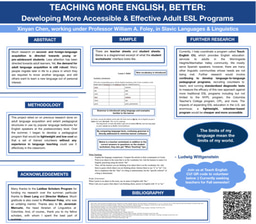Field Journal Week 2
Last week the trainings and discussions we had cut across the disciplines. How does the interdisciplinary nature of this program, the fact that students are focusing on such a diverse range of projects, help you think about your project and/or your academic interests more broadly?
I think the interdisciplinary nature of this program is wonderful because it grants me such flexibility to pursue unorthodox ideas, think outside the box, and—perhaps most importantly–learn to communicate the essence of what I am doing to those who work outside of my particular field of interest. Right now, I think science, and academia more broadly, is facing an enormous communication and public relations challenge. People don't understand how valuable science is for everyday life, because academia has so distanced itself in its "ivory tower" from popular culture in the name of "rigor" and "expertise." I think back to earlier scientific revolutions and worry at how people have lost the ability and desire to pursue science as a hobby. This might seem off-topic, but I think to the Poetism movement of 1920s Prague, driven by artists who believed that art should be accessible to all and should root itself to the ordinary.
I can't help but think that public trust in science has fallen so far because we have failed to communicate its importance to non-career scientists. Dabbling in science out of an overwhelming curiosity to know more about the world has become more and more inaccessible to the general public. I am so privileged to be here, learning from brilliant mentors, with state-of-the-art library and lab systems at my disposal, but most of our scientific knowledge is paywalled, institutionalized, de-publicized. I think one of the major goals of a foundation such as Laidlaw is to publicize science: To reiterate and reinforce to the public why, exactly, science matters; and to protect not just the ability of career academics to pursue their curiosity, but to open up the gates so that everyday curiosities become important again. I think this spirit of dabbling is my biggest takeaway from the interdisciplinary approach that Laidlaw takes—I may not be a professional psychologist, or a professional economist, or a professional in any number of research pursuits that my classmates excel at, but I'm curious. Programs like these help drive my curiosity down paths I hadn't originally suspected I would be interested in; I learn broadly and feverishly and sometimes chance upon approaches I find useful in my own work in an environment entirely alien from what I am used to. And I am forever grateful for these capsules of curiosity which I believe drives the engine of scientific inquiry.
As you begin your individual research projects this week, do you anticipate any challenges in getting started? If so, what are they?
Yes; I think the biggest challenge I will face in getting started is to not seek perfection with the first draft. I sometimes get so caught up in the finer details of the first iteration of my work that I forget it is more important to finish, and then refine. With this project, I hope to blow full steam ahead and not worry about perfection until at least I am done with the major skeletons.


Please sign in
If you are a registered user on Laidlaw Scholars Network, please sign in
I love this!
I really appreciate hearing about science communication from a different perspective from my own as a STEM researcher. I’ve faced a similar challenge as I’m diving into a field that I don’t specialize in: technology and AI. When I first met with my mentors about the AI component of the project, we didn’t know if the music technology resources I needed existed yet let alone were accessible. We eventually found something that was perfect for the project which had open access, but the only way this was possible was through going over a multitude of resources in the Columbia Library system, many of which would be paywalled to the public. Going from a first-generation, low income college student from a small town in Oregon to a student at Columbia was kind of a resource shock. I went from being in an under-resourced situation to having an over-abundance of academic resources. One of my fears is that I’ll forget what it’s like to not have all the academic resources I want at my fingertips. I think one of the many benefits of the Laidlaw program is the opportunity to have these interdisciplinary conversations with many talented scholars. Thank you so much Cara for using this platform to talk about science communication!